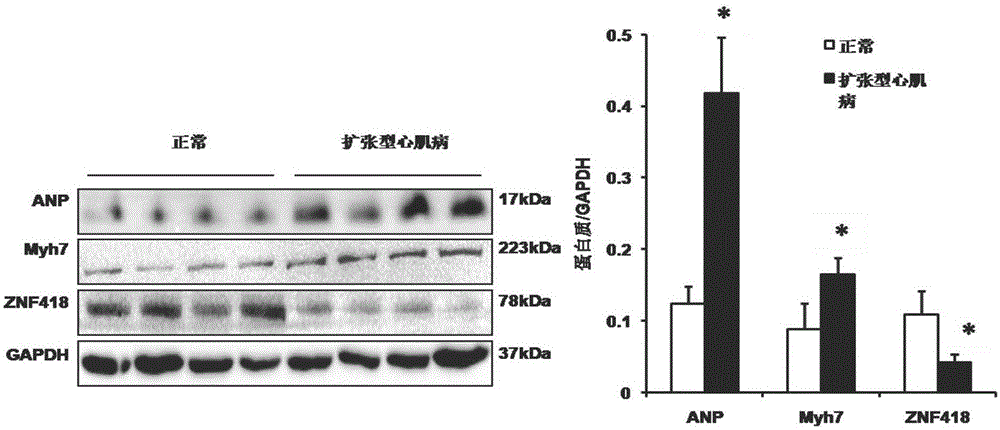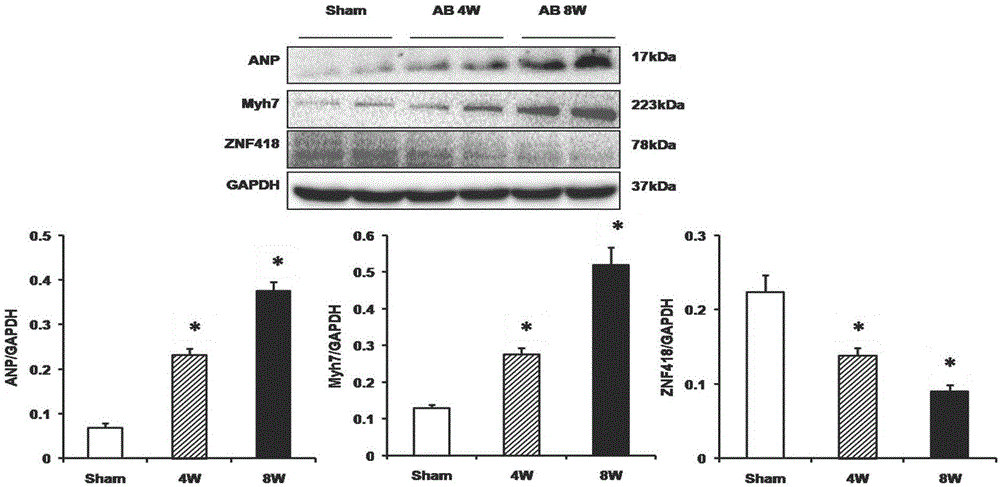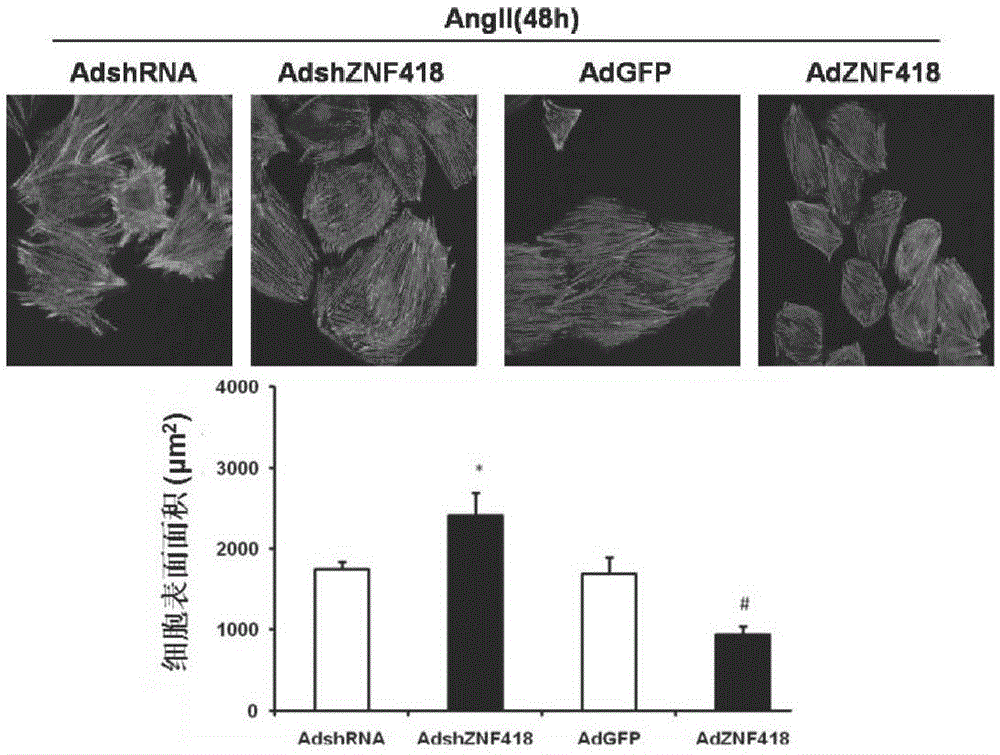Application of ZNF418 (zinc finger protein 418) to treatment of myocardial hypertrophy
A zinc finger protein and myocardial hypertrophy technology, which is applied in the field of preparation of drugs for the prevention, alleviation and/or treatment of myocardial hypertrophy, can solve the problems of no therapeutic drugs and schemes, complex pathogenesis of HCM, and unclear mechanism, and achieve inhibition Cardiac hypertrophy, anti-cardiac fibrosis, myocardial hypertrophy, and cardiac function protection effects
- Summary
- Abstract
- Description
- Claims
- Application Information
AI Technical Summary
Problems solved by technology
Method used
Image
Examples
Embodiment 1
[0089] [Example 1] Expression of ZNF418 in the hearts of normal people and patients with cardiomyopathy
[0090] Normal human hearts (individuals donated by non-cardiac causes of death), hearts of patients with dilated cardiomyopathy (recipients replaced by patients undergoing heart transplantation, DCM) and SDS-PAGE-immunoblotting tests (Westernblot) were performed on proteins extracted from the hearts. ), combined with antibodies that specifically recognize ZNF418 protein and cardiomyocyte hypertrophy markers ANP (Millipore, AB2232) and Myh7 (santacruz, sc53090) to detect the expression of ZNF418 (ProSci, 26-559), GAPDH (Cell Signaling Technology, 2128 ) as an internal reference. Test results such as figure 1 As shown, the expression of cardiomyocyte hypertrophy markers ANP and Myh7 in the hearts of patients with dilated cardiomyopathy was significantly up-regulated, and the expression of ZNF418 was significantly down-regulated ( figure 1 );.
Embodiment 2
[0091] [Example 2] Expression of ZNF418 in wild-type mouse Sham group and AB operation 4W, 8W hearts
[0092] 1. The myocardial hypertrophy model adopts aortic arch coarctation surgery, and the operation process of the model is as follows:
[0093] 1.1 Preoperative preparation
[0094] (1) Anesthesia: First weigh the mice, calculate the required amount of anesthetic (3% pentobarbital sodium) according to 90 mg / kg body weight, inject intraperitoneally, and record the injection time point. There is no obvious reaction between tail and toe pinching and the mouse is in good condition. This is the standard for successful anesthesia (generally there is no obvious reaction about 10 minutes after injection, and the mouse has a reaction to pinch toe about 50 minutes after anesthesia, and about 30 minutes after anesthesia is the best operation time).
[0095] (2) Preparation of the operation area: the skin of the left chest, left chest and armpit of the left forelimb of the mouse was r...
Embodiment 3
[0105] [Example 3] The effect of ZNF418 interference (AdshZNF418) and overexpression (AdZNF418) adenovirus on the expression of ZNF418 in AngII-stimulated primary cardiomyocytes
[0106] 1. Primary neonatal SD rat cardiomyocyte culture
[0107] Sprague-Dawley neonatal rat cardiomyocytes were isolated and cultured for 1 day, and the medium was changed after 48 hours of primary cardiomyocytes.
[0108] 2. Effect of ZNF418 interference (AdshZNF418) and overexpression (AdZNF418) adenovirus on AngII-induced cardiomyocyte hypertrophy model
[0109] AdshRNA (adenovirus containing shRNA (silencing RNA), used as a control), AdshZNF418 (adenovirus containing shRNA-ZNF418 (silencing RNA-ZNF418 fusion protein)), AdGFP (adenovirus containing GFP (green fluorescent protein), used as control) and AdZNF418 (adenovirus containing GFP-ZNF418 green fluorescent protein-ZNF418 fusion protein) adenovirus 10MOIs respectively infected primary cardiomyocytes cultured for 3 days, and after 12 hours we...
PUM
 Login to View More
Login to View More Abstract
Description
Claims
Application Information
 Login to View More
Login to View More - R&D
- Intellectual Property
- Life Sciences
- Materials
- Tech Scout
- Unparalleled Data Quality
- Higher Quality Content
- 60% Fewer Hallucinations
Browse by: Latest US Patents, China's latest patents, Technical Efficacy Thesaurus, Application Domain, Technology Topic, Popular Technical Reports.
© 2025 PatSnap. All rights reserved.Legal|Privacy policy|Modern Slavery Act Transparency Statement|Sitemap|About US| Contact US: help@patsnap.com



